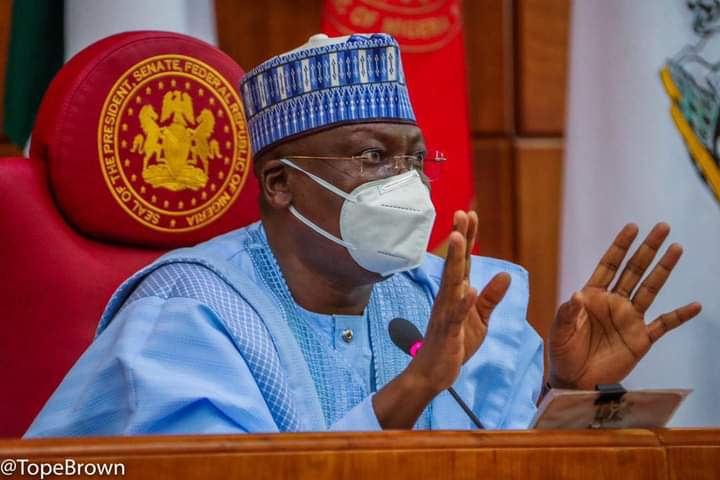Senate President Ahmad Lawan is one of the longest-serving federal lawmakers in Nigeria. He has been in the National Assembly since the beginning of the Fourth Republic in 1999.
By June 2023, when the life of the 9th National Assembly will have elapsed, Lawan must have spent 24 years in the federal parliament.
PROFILE: Machina, Buni’s former boss, who fought Lawan to standstill
Transforming the abusive relationship between citizens and elected leaders
However, the Senate president is on his way out of the parliament, having lost out in the fierce battle with Bashir Machina for the Yobe North senatorial ticket of the All Progressives Congress (APC), signalling an end to his two-decade-long lawmaking career.
Lawan’s road out of the National Assembly began when he contested the presidential primaries of the ruling party but lost to Asiwaju Bola Tinubu.
Although he did not take part in the senatorial primary, the party had sent his name to INEC as its candidate but the electoral body refused to acknowledge him.
Machina, who won the primary, had resisted pressure on him to step down for Lawan, and headed for the court to seek justice.
On Wednesday, a Federal High Court in Yobe ordered the Independent National Electoral Commission (INEC) to recognise Machina as the authentic candidate for the senatorial district.
Responding, Lawan, in a statement he signed on Thursday, said he had accepted the judgement of the court and would not appeal.
The statement titled: “Court Judgement on Yobe North Senatorial District Candidacy” reads: “Yesterday, Wednesday, 28th September 2022, the Federal High Court in Damaturu delivered judgement on the rightful candidate for Yobe North Senatorial District for the 2023 National Assembly elections.
“The said judgement disqualifies my candidature and therefore my participation in the elections.
“After due consultations with my political associates, supporters and well-wishers, I have decided not to appeal against the judgement. I accept the judgement.
Foray into politics
Born in Yobe in 1959, Lawan ventured into politics in 1998 as the vice chairman, Yobe State chapter of the All Progressives Congress (APP). In 1999, he served as the secretary of the Electoral Committee at the APP National Convention in Abuja.
Later that year, Lawan was elected to the House of Representatives to represent Bade/Jakusko Federal Constituency of Yobe State. He was re-elected in 2003.
While in the Green Chamber, Lawan chaired the House of Representatives Committee on Agriculture (2003-2005) and later Education Committee (2005-2007).
Lawan switched to the Senate in 2007 to represent Yobe North Constituency. He has been representing the senatorial district since then.
Lawan was appointed as the Chairman of the Public Accounts Committee in 2009. That same year, he initiated and sponsored the Desertification Control Commission Bill.
He served in that capacity in the 6th and 7th Assembly – between 2009 and 2015.
He also headed the Senate Committee on Defence (2015–2017) and served as Chairman of numerous Senate ad hoc committees, including the ad hoc Committee on Privatisation.
In 2015 Lawan was favoured by his party, which won majority in the Red Chamber for the position of Senate president. But Senator Bukola Saraki, with the support of the opposition senators, emerged as the Senate president.
Saraki was elected by 57 senators, most of them PDP members, when majority of APC senators were at the International Conference Centre for a meeting with President Muhammadu Buhari.
He later emerged as the Majority Leader of the 8th Senate after Senator Ali Ndume was sacked from the position in January 2017.
In 2019, Lawan was again favoured by APC for the Senate president’s seat, and contested against Ndume, whom he replaced as the Senate Leader in the 8th Assembly. Lawan garnered 79 votes to emerge as Senate president.
Senate presidency
The 9th Senate, under Lawan, has not only been peaceful, but also However, the cordial legislature-executive relationship had elicited mixed reactions, with critics euphemistically referring to the 9th Assembly as a “rubber-stamp” legislature for swiftly endorsing federal government requests forwarded to it. a harmonious working relationship with the executive.
The chummy legislature-executive relationship had however attracted mixed reactions, with critics euphemistically calling the 9th Assembly a “rubber-stamp” legislature, for speedily endorsing the federal government’s requests forwarded to it.
Since the inception of the 9th Senate, none of the loan requests forwarded to the Red Chamber had been rejected.
Lawan had been unequivocal that the Senate under him will not be irrationally confrontational or, deliberately embark on a collision course with the executive as witnessed during the 8th Senate.
In defence of his “same-page” relationship with the executive, Lawan said the Senate “will commit to the partnership rather than partisanship and between us and the executive arm of government, we will choose unity of purpose over conflict and discord.”
Lawan Senate presidency is also reputed for confirming presidential nominees in record time.
Nigerians were stunned when the Senate, in 2019, screened all 43 ministerial nominees in five days. What was supposed to be a confirmation hearing morphed into an endorsement hearing as most of them were asked to take their “bow and go”.
It took the 8th Senate 30 days to conduct the screening of 36 nominees.
Lawan had said the speed of events at the Senate was deliberate.
“We know the need for us to act fast. Time is of the essence. In the next two years or so, the Nigerian political landscape will be dotted by people campaigning for the presidency, governorships and the rest of it. And that will in a way cause some disruption or slow down governance,” he said.
Among the biggest achievements of Lawan’s Senate presidency is the quick passage of the Appropriation Bill before the New Year. Several critical bills, which had suffered setbacks for years, were also passed.
Prominent among them are the Electoral Bill, Petroleum Industry Bill, Deep Off-shore and Inland Basin Production Sharing Contracts Bill, Companies and Allied Matters Act (CAMA) 2020, Nigeria Police Act 2020 and Nigerian Correctional Services Act 2019.

 Join Daily Trust WhatsApp Community For Quick Access To News and Happenings Around You.
Join Daily Trust WhatsApp Community For Quick Access To News and Happenings Around You.


